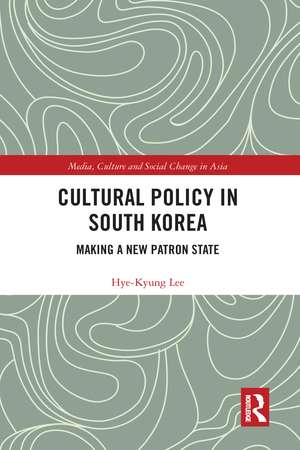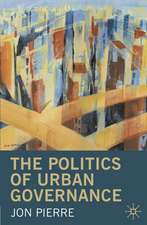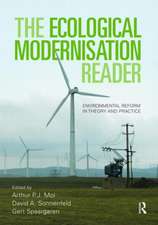Cultural Policy in South Korea: Making a New Patron State: Media, Culture and Social Change in Asia
Autor Hye-Kyung Leeen Limba Engleză Paperback – 30 iun 2020
| Toate formatele și edițiile | Preț | Express |
|---|---|---|
| Paperback (1) | 329.94 lei 3-5 săpt. | +35.23 lei 7-13 zile |
| Taylor & Francis – 30 iun 2020 | 329.94 lei 3-5 săpt. | +35.23 lei 7-13 zile |
| Hardback (1) | 763.39 lei 6-8 săpt. | |
| Taylor & Francis – 26 iul 2018 | 763.39 lei 6-8 săpt. |
Din seria Media, Culture and Social Change in Asia
-
 Preț: 378.83 lei
Preț: 378.83 lei -
 Preț: 297.40 lei
Preț: 297.40 lei -
 Preț: 364.22 lei
Preț: 364.22 lei - 18%
 Preț: 1276.52 lei
Preț: 1276.52 lei - 28%
 Preț: 820.73 lei
Preț: 820.73 lei -
 Preț: 367.83 lei
Preț: 367.83 lei - 18%
 Preț: 1272.58 lei
Preț: 1272.58 lei - 18%
 Preț: 1220.31 lei
Preț: 1220.31 lei -
 Preț: 487.47 lei
Preț: 487.47 lei - 18%
 Preț: 1162.84 lei
Preț: 1162.84 lei -
 Preț: 383.63 lei
Preț: 383.63 lei - 18%
 Preț: 1167.71 lei
Preț: 1167.71 lei -
 Preț: 415.24 lei
Preț: 415.24 lei - 18%
 Preț: 703.45 lei
Preț: 703.45 lei - 26%
 Preț: 874.74 lei
Preț: 874.74 lei - 18%
 Preț: 1054.27 lei
Preț: 1054.27 lei -
 Preț: 459.71 lei
Preț: 459.71 lei - 18%
 Preț: 1003.43 lei
Preț: 1003.43 lei - 11%
 Preț: 323.91 lei
Preț: 323.91 lei -
 Preț: 383.63 lei
Preț: 383.63 lei - 15%
 Preț: 426.77 lei
Preț: 426.77 lei - 18%
 Preț: 1059.84 lei
Preț: 1059.84 lei - 18%
 Preț: 1058.43 lei
Preț: 1058.43 lei -
 Preț: 412.19 lei
Preț: 412.19 lei - 18%
 Preț: 1057.75 lei
Preț: 1057.75 lei - 18%
 Preț: 1164.92 lei
Preț: 1164.92 lei - 18%
 Preț: 1219.72 lei
Preț: 1219.72 lei - 18%
 Preț: 1054.75 lei
Preț: 1054.75 lei - 18%
 Preț: 1108.73 lei
Preț: 1108.73 lei -
 Preț: 402.13 lei
Preț: 402.13 lei - 18%
 Preț: 1219.72 lei
Preț: 1219.72 lei -
 Preț: 408.74 lei
Preț: 408.74 lei - 18%
 Preț: 1216.52 lei
Preț: 1216.52 lei - 26%
 Preț: 846.09 lei
Preț: 846.09 lei - 18%
 Preț: 1270.19 lei
Preț: 1270.19 lei - 18%
 Preț: 1219.65 lei
Preț: 1219.65 lei -
 Preț: 409.69 lei
Preț: 409.69 lei - 18%
 Preț: 1166.17 lei
Preț: 1166.17 lei
Preț: 329.94 lei
Nou
Puncte Express: 495
Preț estimativ în valută:
63.14€ • 65.68$ • 52.13£
63.14€ • 65.68$ • 52.13£
Carte disponibilă
Livrare economică 22 martie-05 aprilie
Livrare express 08-14 martie pentru 45.22 lei
Preluare comenzi: 021 569.72.76
Specificații
ISBN-13: 9780367588557
ISBN-10: 0367588552
Pagini: 180
Dimensiuni: 156 x 234 x 15 mm
Greutate: 0.78 kg
Ediția:1
Editura: Taylor & Francis
Colecția Routledge
Seria Media, Culture and Social Change in Asia
Locul publicării:Oxford, United Kingdom
ISBN-10: 0367588552
Pagini: 180
Dimensiuni: 156 x 234 x 15 mm
Greutate: 0.78 kg
Ediția:1
Editura: Taylor & Francis
Colecția Routledge
Seria Media, Culture and Social Change in Asia
Locul publicării:Oxford, United Kingdom
Public țintă
PostgraduateCuprins
Acknowledgements
Notes on the Romanisation of Korean
Chapter 1. Introduction: Culture and the State
Chapter 2. The Origins of Cultural Policy
Chapter 3. Modernising Country and Nationalising Culture
Chapter 4. Democracy and Cultural Policy Transformation
Chapter 5. Doing Cultural Policy in the Neoliberal Era
Chapter 6. The Korean Wave Inside Out
Chapter 7. Conclusion: Past, Present and Future of the New Patron State
Notes on the Romanisation of Korean
Chapter 1. Introduction: Culture and the State
Chapter 2. The Origins of Cultural Policy
Chapter 3. Modernising Country and Nationalising Culture
Chapter 4. Democracy and Cultural Policy Transformation
Chapter 5. Doing Cultural Policy in the Neoliberal Era
Chapter 6. The Korean Wave Inside Out
Chapter 7. Conclusion: Past, Present and Future of the New Patron State
Notă biografică
Hye-Kyung Lee is a Senior Lecturer in Cultural and Creative Industries at King’s College London, UK.
Recenzii
This book is a captivating and greatly needed addition to cultural policy studies. As the first English-language book on Korean cultural policy, it aptly historicizes the evolution of Korean cultural policy since the early 20th century and clearly articulates diverse perspectives embedded in the national cultural policy. By rendering the tensions and negotiations among various theoretical and practical frameworks, in particular between state-developmentalists and neoliberal globalists, surrounding major cultural policy issues, it clarifies the reasons why media scholars, cultural producers, and policy makers refocus on cultural policy in the ever-growing Korean cultural industries and the Korean Wave contexts. Without a doubt, this is timely and an indispensable chaperon for researchers and students who are interested in cultural policy studies, globalization studies, media studies, and Korean studies. - Dal Yong Jin, Simon Fraser University
For those of us less familiar with Korean history, Hye-Kyung Lee gives us a richly contextualised and accessible account of cultural policies since the era of Japanese colonial rule, explaining their evolution both in terms of South Korea’s own political dynamics since the 1940s and the nationally diffracted effects of globalization. At the same time, Lee has extensive familiarity with Anglophone discussions of cultural policy, and the book represents an incisive and original intervention in those discussions. In particular, it recasts or ‘provincializes’ prevailing conceptions of state-culture-economy relations, and shows an admirable awareness of the broad range of fronts on which cultural policies have operated. - Jeremy Ahearne, University of Warwick
In this timely book Hye-Kyung Lee examines the history of state patronage in South Korea during the twentieth century, culminating in the current era sometimes described as the Korean Wave. She considers trajectories of cultur
For those of us less familiar with Korean history, Hye-Kyung Lee gives us a richly contextualised and accessible account of cultural policies since the era of Japanese colonial rule, explaining their evolution both in terms of South Korea’s own political dynamics since the 1940s and the nationally diffracted effects of globalization. At the same time, Lee has extensive familiarity with Anglophone discussions of cultural policy, and the book represents an incisive and original intervention in those discussions. In particular, it recasts or ‘provincializes’ prevailing conceptions of state-culture-economy relations, and shows an admirable awareness of the broad range of fronts on which cultural policies have operated. - Jeremy Ahearne, University of Warwick
In this timely book Hye-Kyung Lee examines the history of state patronage in South Korea during the twentieth century, culminating in the current era sometimes described as the Korean Wave. She considers trajectories of cultur
Descriere
The control and promotion of culture have been bound up with politics in Korea to a surprising degree. This book traces the development of cultural policy in South Korea from Japanese colonial rule to the present day, highlighting this strong connection to wider government policy. Amongst many other subjects, the book discusses how the arts have















